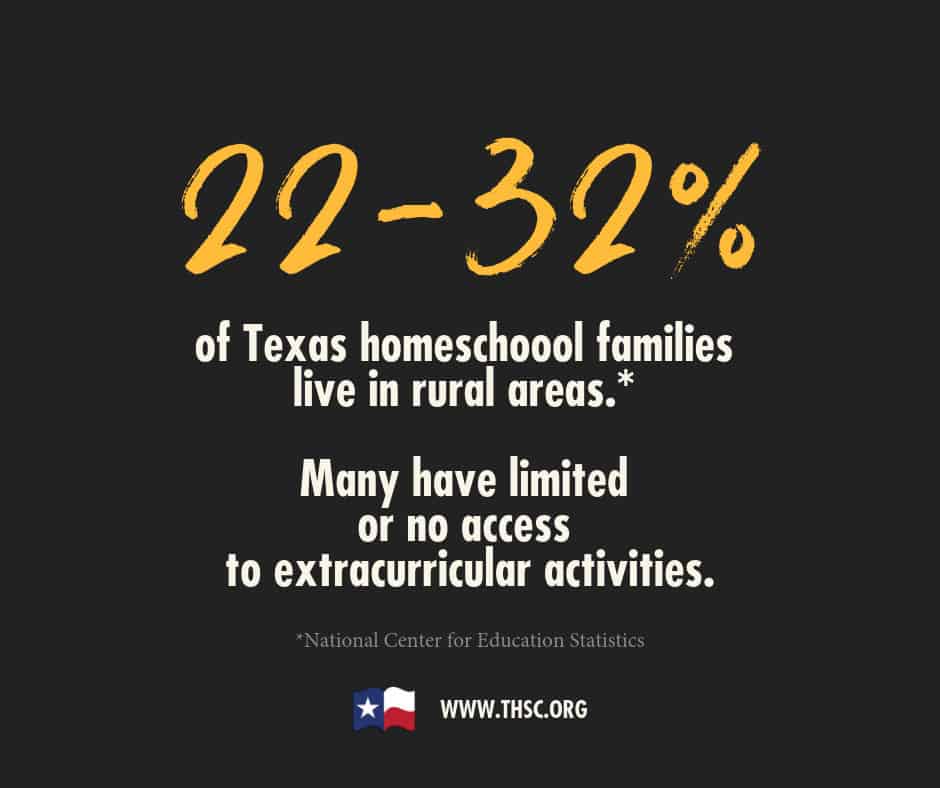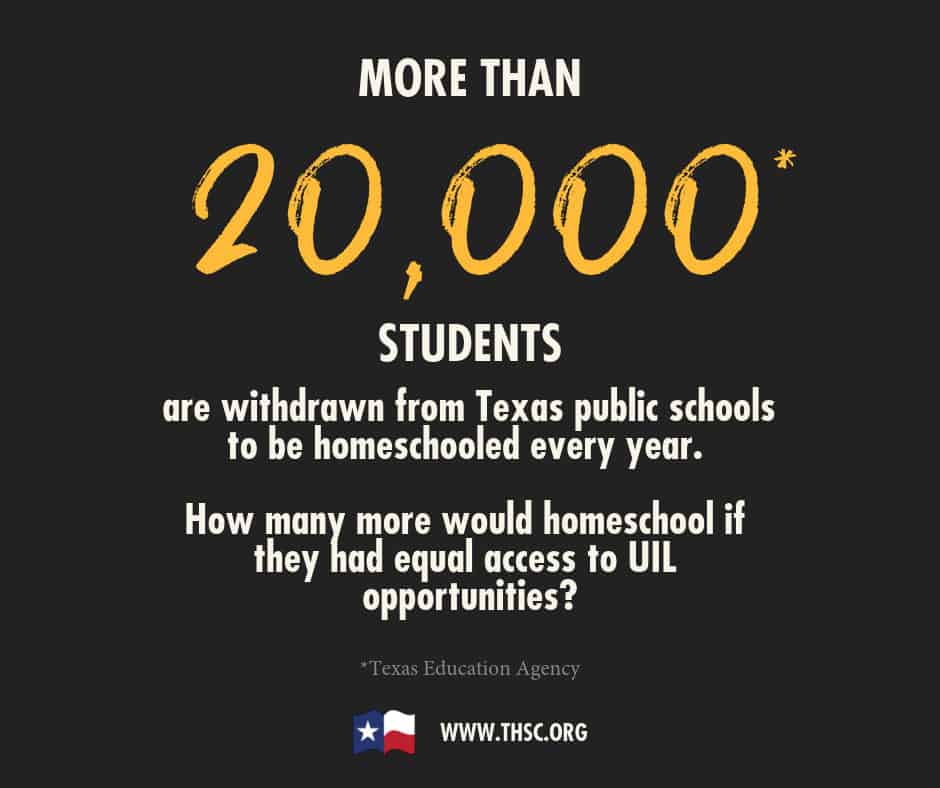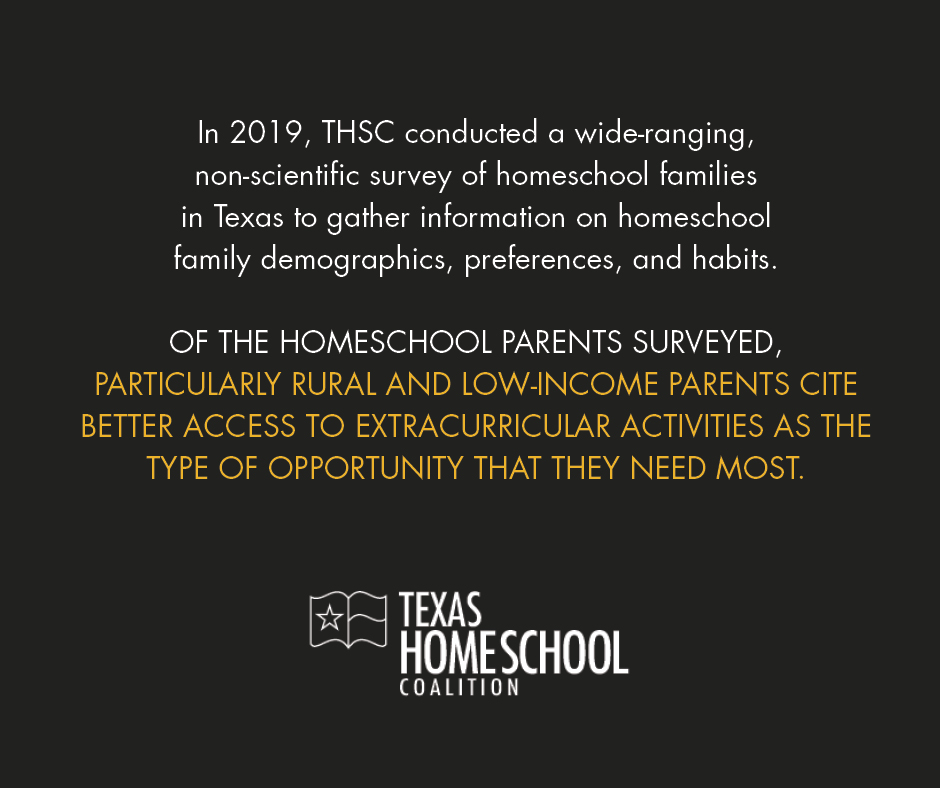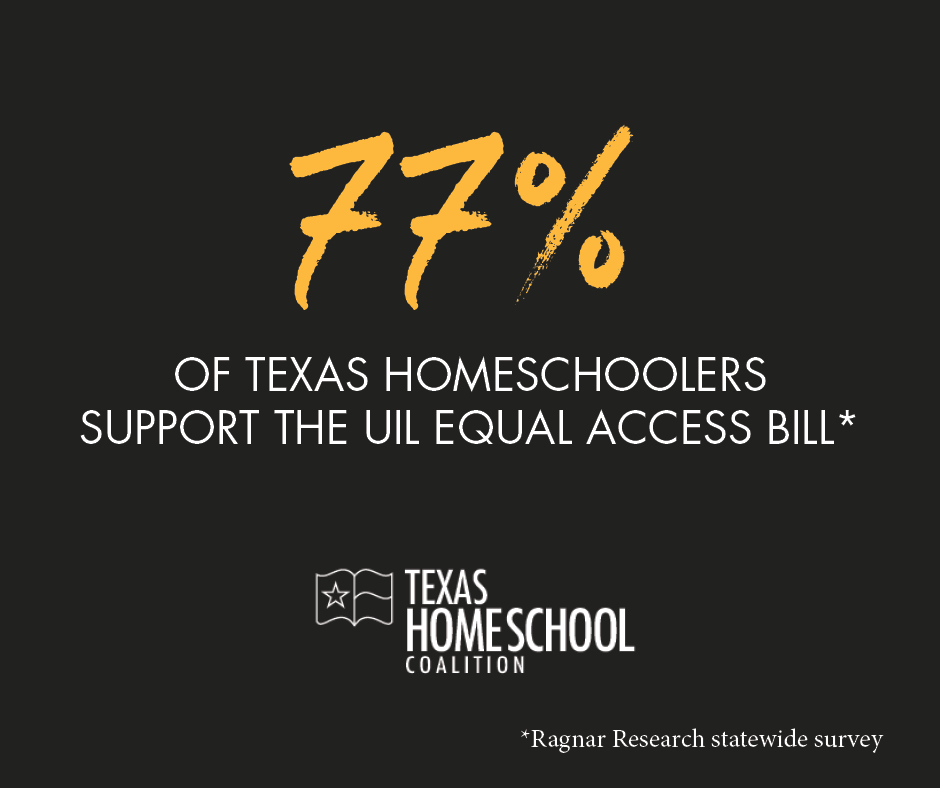 In addition, approximately 22 – 32 percent of homeschool families live in rural parts of the state where private extracurricular options are few or non-existent, even though the activities they fund through the public school may be across the street. Students often have difficulty finding alternative options and participation is often too expensive even when such programs are available. As a result, many families choose not to homeschool at all because their children will not have access to public school UIL groups that can lead to college scholarship opportunities.
In addition, approximately 22 – 32 percent of homeschool families live in rural parts of the state where private extracurricular options are few or non-existent, even though the activities they fund through the public school may be across the street. Students often have difficulty finding alternative options and participation is often too expensive even when such programs are available. As a result, many families choose not to homeschool at all because their children will not have access to public school UIL groups that can lead to college scholarship opportunities.  Every year, more than 20,000 families in Texas withdraw their children from the public schools to homeschool them. Countless more would do the same if they had access to these opportunities.
Every year, more than 20,000 families in Texas withdraw their children from the public schools to homeschool them. Countless more would do the same if they had access to these opportunities. 
 The 35 states listed below already allow homeschool students to participate in their versions of UIL.
The 35 states listed below already allow homeschool students to participate in their versions of UIL. - Alabama
- Alaska
- Arizona
- Arkansas
- Colorado
- Florida
- Idaho
- Illinois
- Indiana
- Iowa
- Kansas
- Louisiana
- Maine
- Massachusetts
- Minnesota
- Missouri
- Nebraska
- Nevada
- New Hampshire
- New Jersey
- New Mexico
- North Carolina
- North Dakota
- Ohio
- Oregon
- Pennsylvania
- Rhode Island
- South Carolina
- South Dakota
- Tennessee
- Utah
- Vermont
- Washington
- Wisconsin
- Wyoming

- According to a study done by Ragnar Research, 77 percent of Texas homeschoolers support the UIL Equal Access Bill. Only 16% oppose it.
- Thousands of homeschooling families pay property taxes to fund public school activities and facilities, but their homeschooled children aren’t allowed to use them.
- Every year, more than 20,000 families in Texas withdraw their children from the public schools to homeschool them. Many more who wish to homeschool are unable to afford alternative extracurricular options for homeschoolers, if there are any available at all. Their children remain in public school as a result.
- Thirty-five other states already allow homeschool students to participate in public school extracurricular activities funded by their family’s tax dollars.
- UIL was created in 1913 for all Texas students. In 1915, eligibility was restricted to white public school students. According to testimony in the Leeper v. Arlington ISD case, 80 percent of the students in Texas were homeschooled at the time of the restriction. While minority students were finally allowed to participate in UIL beginning in 1967, homeschool students are still excluded. There are an estimated 350,000 homeschool students in Texas. Governing magazine estimates that educating a single public school student costs $8,299 annually. Homeschoolers thus save the state approximately $2.7 billion each year.
- Heisman Trophy winner Tim Tebow was a homeschool student in the state of Florida, where he was able to play on his local public school’s football team. He went on to become one of the greatest quarterbacks in college football history.
- Collin Klein, a football player and 2012 Heisman Trophy finalist, was also a homeschool student who played on his public school team in Colorado.
- This bill uses the same definition of a homeschool student that has already been included in the Texas Education Code since 2007. Namely, “a student who predominantly receives instruction in a general elementary or secondary education program that is provided by the parent, or a person standing in parental authority, in or through the child’s home.”
- The homeschool students who are accepted will participate at the school just like the students who attend that school.
- Homeschool students who participate in UIL programs are subject to the same requirements as the public school students in that program (such as practice schedules, age and performance).
- The student’s parent is responsible for the academic oversight of their student’s participation in UIL programs.
- During the first six weeks of a school year, students gain eligibility by submitting a passing score (average or above) on any nationally normed standardized assessment test of the family’s choice. Examples include the Iowa Test of Basic Skills, the Stanford Achievement Test, the California Achievement Test, or the Comprehensive Test of Basic Skills. These tests are submitted once every two school years and can be administered by a third party rather than being taken at the school.
- After the first six weeks of the school year, the child’s parent will periodically (in accordance with the school’s grading calendar) provide written verification that the child is passing all of their classes.
- Homeschool students may not participate in UIL programs during the remainder of a school year in which they have been enrolled in public school.
- The UIL may not prevent homeschool students from participating in UIL programs for which they are eligible and for which they have qualified.
- This bill prevents state agencies, governmental bodies or school districts from regulating or overseeing homeschools.
- The public school may not require changes to a homeschool curriculum or homeschool methods as a condition for eligibility in UIL programs.
Frequently Asked Questions (FAQs):
Will programs like this draw the government’s attention to homeschoolers and encourage regulation?
Actually, history has shown the opposite to be true. The lack of regulation in Texas isn’t due to homeschoolers not interacting with the government. Rather, Texas homeschool freedoms exists due to vigilance. Watch this video to learn about the history of homeschooling in Texas. The minority of homeschoolers who oppose the UIL Equal Access Bill fear the potential of increased government regulation. Fear has been the number one threat to homeschool freedom since the very beginning of the homeschool movement. Attorney Shelby Sharpe, who argued the Leeper court case that legalized homeschooling in Texas, faced fierce opposition from a vocal minority of homeschoolers who tried to block the lawsuit. That case ultimately gave Texas families the right to homeschool. Homeschooling is legal today because Shelby Sharpe and other homeschool leaders did not give in to fear. Watch Shelby Sharpe discuss when fear from a minority of the homeschool community prompted an effort to block the historic Leeper case. https://www.youtube.com/watch?v=uUewD-Yqhis THSC and the homeschool community have never been afraid to boldly defend and fight for family freedoms in Texas. It was boldness, not fear, that motivated homeschoolers to:
- Win the Leeper case
- Pass legislation giving homeschoolers access to dual credit classes
- Pass legislation requiring equal PSAT access for homeschoolers
- Pass legislation ending college admissions discrimination against homeschoolers.
Why should homeschool families be allowed to access UIL activities? Shouldn’t they be willing to homeschool without that access?
We believe that each family should make the decisions they feel are best for their family. Those who want their children to participate in UIL activities should be allowed to make that decision. Those who don’t feel that way should also be allowed to make that decision. All families should not be denied access just because some families don’t want access. Homeschooling is about letting each family do what is right for them. Each family should be empowered to raise their own children.
Why would any homeschooler want their children to participate in public school programs?
Many families who live in rural areas cannot access alternative extracurricular options for their children, even though their tax dollars fund the programs at their local public school. Homeschoolers who live in metropolitan areas cannot afford private options when they have already paid the taxes to fund public school UIL programs.
Why does the bill distinguish homeschools from other private schools?
Homeschools are merely one type of private school and are regulated differently from other types of private schools. The definition of homeschooling used in the UIL Equal Access Bill has been a part of Texas law since 2007 and is regularly used to protect homeschoolers from government abuse against families.
Will the UIL Equal Access Bill change the rules for homeschool participation in 4H and TMEA?
No. Both 4H and TMEA are private, non-profit organizations that develop and follow their own guidelines for student participation. Legislative changes to UIL rules do not affect the rules adopted by 4H or TMEA. Both organizations have confirmed to THSC that they operate independently from the UIL and are not affected by the bill. The director of 4H stated that they are aware of the bill and that they do not expect any changes as a result of the legislation:
Does the UIL Equal Access Bill’s testing requirement undermine the authority of the family?
Subsection D of the UIL Equal Access Bill explicitly guarantees that families retain ultimate authority and oversight of all academic standards relating to participation in UIL activities. The bill also explicitly states that a school district is required to accept test scores provided by a third party, which means that families have the authority to determine if their child will take a test, which test the child will take and where they will take it.
Don’t other states that allow homeschoolers UIL access also have burdensome regulations?
Thirty-five other states, with both high and low levels of regulation, already allow homeschool students to participate in public school interscholastic activities. Eight of those states have homeschool laws that are similar to or even less restrictive than Texas laws. And none of the thirty-five states that allow homeschoolers this access have seen increased regulation as a result.
Aren’t there already plenty of extracurricular opportunities available to homeschool students?
The 33 percent of homeschool students who live in rural areas of Texas do not have the same opportunities as students who live in metropolitan areas. Many of them must drive for hours to reach the sports, music or drama program closest to them. Homeschoolers who live in metropolitan areas frequently cannot afford the extracurricular activities available through homeschool programs. Additionally, homeschool students do not have the option of playing in the private school league (TAPPS).
Will this bill hurt homeschool athletic leagues/associations?
Based on states that have implemented the equivalent of a UIL Equal Access Bill, we believe that this legislation will have a very minimal impact on homeschool athletic teams. And since the programs are intended to benefit students, THSC believes that students should have the ability to choose those programs which are best for them.
Will this law result in recruiting?
There is no reason to believe that this legislation will cause recruiting. The bill is worded so that homeschool students will be able to participate in their school district’s extracurricular activities only if they live in that particular district and were already qualified to attend the school in question. Students who leave public school to homeschool will be ineligible to play in UIL activities for the remainder of that school year. The presence of homeschoolers in UIL activities will not result in any unique effects with regard to recruiting.
Are the school districts liable for injuries to homeschool students?
Texas school districts are currently not liable for injuries sustained during extracurricular activities. Each school district requires parents to sign a waiver before allowing their student to participate in these activities. The same liability rules would apply to homeschoolers since homeschool students would compete on the same basis as public school students.
How do we verify that students are being taught at home?
The state of Texas acknowledges that the parents of a homeschooled student are solely responsible for their child’s education. The child is accountable exclusively to their parents for the quality of his or her education. Texas does not require any regular assessment of the child’s academic progress. The UIL Equal Access Bill implements verification standards as close as possible to the standards required of public school participants. Public school students must receive passing grades in each of their classes. In the case of homeschoolers, parents will verify that their student has passing grades. Public school students also have to pass regular standardized tests demonstrating grade advancement to be eligible. For homeschoolers, the student would submit a passing grade from the nationally normed standardized test of his or her choice. Questions about the quality of homeschool education are laid to rest by national studies which repeatedly demonstrate that homeschool students score in the eightieth percentile on national tests. In comparison, their public school counterparts score at the fiftieth percentile. The bill also includes provisions to prevent failing public school students from gaming the system by claiming that they are “homeschooled.” Read the legislative language from the most recent version of the bill, Senate Bill 718 and House Bill 1324.
Will public and homeschool students have to meet the same immunization requirements?
The bill as currently written requires homeschool students to meet the same requirements as public school students in terms of physical condition, qualifications and responsibilities. As a result, homeschool students who choose to participate in UIL activities will be required to meet the same immunization standards as public school students.
“My son is also an accomplished, highly-ranked violinist at 13. We went to the local middle school (which is five houses down from our house,) and were told that he could not participate in the local orchestra program because he is homeschooled.” – Kelle, homeschool mother
“The objectives of the Texas Education Code do not include a single reference to requirements of students to become exemplary athletes or to participate in competitive sports or rather UIL programs. Yet tens of millions of dollars are extracted annually from Texas taxpayers to support these activities and their infrastructure. What is most egregious is the fact that parents who pay those taxes must subject their children to failing educational systems in order for their student[s] to continue to participate in competitive UIL programs.” – Don, homeschool father
“I’m currently a high school homeschooled senior, so I’ll be graduating this May. So my window of opportunity is essentially closed. But I still strongly believe in and support this bill because I want the right and the ability for my little sister, and hopefully one day my children, to be able to participate in the extracurricular programs that our public schools have to offer.” – Laura, homeschool graduate
“We thought by the time he’s ready to play high school or middle school sports, this will be resolved. Well, he’s 23, he’s in graduate school and unfortunately it’s not resolved.” – John, homeschool father
“My best friends are on my team; we work really hard together. Soon they will be able to have more opportunities to get better at swimming because they will be able to join the school swim team. I would like to have the same opportunity but without leaving homeschool.” – Chloe, homeschool student
“If I chose not to pay property taxes this year to the local school district, my house would be taken away. But the local school district can choose not to allow me to participate or my kids to participate. Yet I have no recourse except to be here in this room.” – Paul, homeschool graduate






